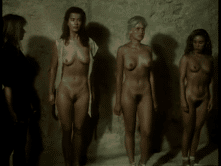
Story of a twenty year old who goes into an asylum, which resembles a prison-like building of the 18th century and where the doctors appear to be just as strange as their patients.
In Tag der Idioten Schroeter returns to a less linear narrative structure, more reminiscent of the episodic films of his second phase. He employs numerous hallucinatory sequences in order to convey the protagonist’s state of mind. Furthermore, much of the film’s meaning is delivered through Carole’s body, facial expressions and gestures rather than through dialogue, and the film’s montage serves to create spatial and temporal disorientation. Schroeter again won the German Film Prize for best direction for this film.
With Tag der Idioten (1982), Schroeter perhaps draws upon his brief studies of psychology. The film centres around a passionate woman, Carole (played by the well-known French actor Carole Bouquet) who feels alienated and repressed by the highly institutionalised public and private spheres of Western society. Unable to extract any kind of emotional response from her reserved boyfriend, Carole seeks attention by falsely denouncing her neighbours as terrorists. With this detail Schroeter briefly touches upon the panic and paranoia that was brought about by the German government crackdown on terrorism at its height during 1977 and Carole’s subsequent institutionalisation in a mental asylum can be seen as an allegory for a society wishing to suppress radical activity of any sort.
Carole Bouquet









